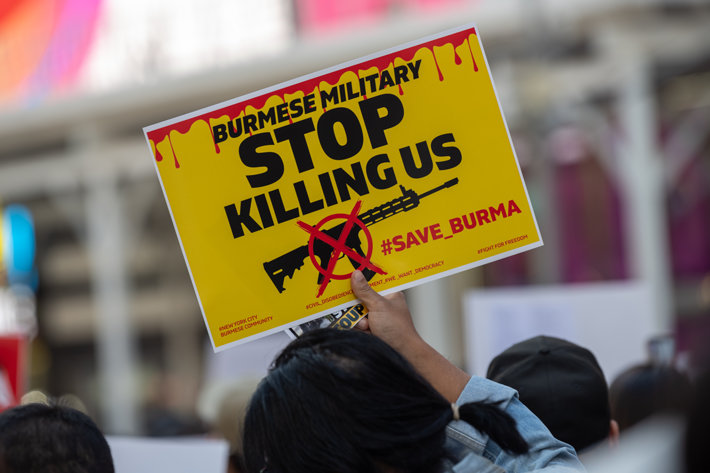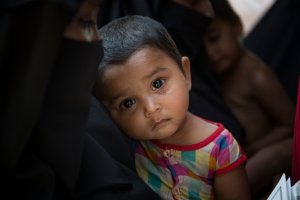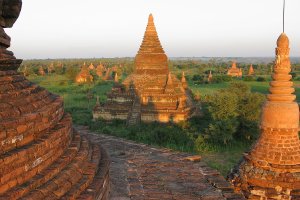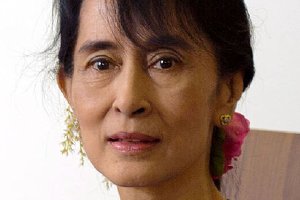Religious leaders and organizations decry the executions of four democracy activists by the military junta in Myanmar—the first time in decades that capital punishment has been meted out in the Southeast Asian nation.

Christian Solidarity Worldwide, a charity group devoted to religious freedom, extended “deepest condolences” to the families of the executed activists. They had been accused of aiding “terror acts” by a popular resistance movement opposed to Myanmar’s military rulers, who have unleashed a brutal crackdown on nationwide protests following a military coup in February 2021.
The activists were sentenced to death in secretive trials earlier this year. The military, known as Tatmadaw in the Burmese language, announced their executions on July 25 without providing any details of when or how they were executed. They are believed to have been slain over the July 23-24 weekend, and the announcement of their deaths took even their family members by surprise.
“Their executions are a blight on the conscience of the international community, which has failed to take significant action as the Tatmadaw has waged egregious violence against innocent civilians for nearly 18 months,” said Benedict Rogers, Christian Solidarity Worldwide's senior analyst for East Asia.
“We call for this moment to be a turning point, and urge UN member states to move beyond the initial imposition of sanctions by some countries and to a more coordinated and concrete response which includes a full and comprehensive global arms embargo against the military and coordinated, comprehensive sanctions against its enterprises.”
Charles Bo, the first Catholic cardinal in the history of Myanmar, said he used his clerical credentials to plead fervently with the military junta not to execute the democracy activists. He also issued an international appeal for action to help stop the executions.
“If the regime goes through with this, it marks a new low for this already brutal, barbaric, inhumane and criminal junta,” the cardinal said in a speech at a virtual conference devoted to Catholic peacebuilding at the University of Notre Dame in June.
The Union of Catholic Asian News, a Hong Kong-based Catholic media service, cited Pope Francis’s strong opposition to executions with these words: “Pope Francis has said that the death penalty is fundamentally against the teachings of Christ because it excludes the possibility of redemption, does not give justice to victims and feeds a mentality of vengeance.”
A strong condemnation of the executions, amid an expression of solidarity with the oppressed people of Myanmar and a call for peace and the rule of law, came from the Jesuit Refugee Service (JRS), a foundation of the Vatican City State engaged in humanitarian work with refugees fleeing conflicts around the world.
“The ill-advised decision of executing the four activists in custody is many steps backwards from the many efforts to move forward the political process to restore justice, peace, and democracy in Myanmar,” said Louie Bacomo, regional director for JRS in the Asia Pacific region.
Bacomo called on the Association of Southeast Asian Nations (ASEAN), a grouping of 10 nations of which Myanmar is a member, “to demonstrate in an unequivocal way their commitment to its values and the integrity of this regional body.”
The government of Cambodia, a predominantly Buddhist nation that is the chair of ASEAN in 2022, called the executions “highly reprehensible” and a sign of the Myanmar military junta’s “gross lack of will” to back the regional grouping’s efforts to facilitate talks between the regime and the activists who oppose it.
Cambodia is scheduled to host the 55th annual ASEAN meeting of foreign ministers from July 29 through August 5—and the executions, less than a week prior to the event, were widely interpreted as an affront to the regional alliance.
“This is a grave setback for ASEAN’s efforts to facilitate a peaceful resolution and national reconciliation in Myanmar,” Vivian Balakrishnan, the foreign minister of Singapore, also an ASEAN country, stated in a Facebook post. “We reiterate our call for the release of all political detainees.”
Saifuddin Abdullah, foreign minister of Malaysia, a Muslim-majority country that is also a member of ASEAN, denounced the executions as a crime against humanity that ought to deprive Myanmar of the privilege of sending political representatives to international ministerial-level meetings.
“We looked at [the executions] as if the junta is making a mockery of the five-point consensus,” Abdullah said at a news conference, referring to an ASEAN plan to resolve the violent crisis in Myanmar. “[A]nd I think we really have to look at this very, very seriously."
In addition to Ko Jimmy, Hla Myo Aung and Aung Thura Zaw, the executed activists included Phyo Zeya Thaw, a former lawmaker and hip-hop artist who was an ally of Nobel Peace laureate Aung San Suu Kyi, the nation’s elected leader who was ousted in last year’s military coup. Charged with 19 criminal offenses that carry a combined maximum prison sentence of nearly 190 years, she was taken from house arrest and placed in solitary confinement in a prison in June.
The executions drew sharp criticism from Michelle Bachelet, United Nations High Commissioner for Human Rights, who described them as “cruel violations of the rights to life, liberty and security.” The condemnation echoed Human Rights Watch acting Asia Director Elaine Pearson, who said the killings were “an act of utter cruelty” that “aims to chill the anti-coup protest movement.”
Calling the executions “the first in Myanmar in decades,” Bachelet said in a July 25 statement she was “dismayed that despite appeals from across the world, the military conducted these executions with no regard for human rights.”
According to Bachelet, since the military coup, 117 people, including two children, have been sentenced to death—41 of them in absentia, and more than 11,500 people continue to be detained for opposing the military’s overthrow of Suu Kyi’s democratically elected government.
“Most concerningly, over 30 percent of over 2,100 people killed since February 2021 have died in military custody—most as a result of ill-treatment,” the UN human rights chief said.
“These depraved acts must be a turning point for the international community,” wrote Tom Andrews, UN Special Rapporteur for Human Rights in Myanmar and Morris Tidball-Binz, UN Special Rapporteur on extrajudicial, summary or arbitrary executions, in a July 25 statement. “What more must the junta do before the international community is willing to take strong action?”
A joint statement issued by the European Union, United States, Britain, Australia, Canada, Japan, New Zealand, Norway and South Korea called the executions “reprehensible acts of violence that further exemplify the regime’s disregard for human rights and the rule of law.”
_______________
From its beginnings, the Church of Scientology has recognized that freedom of religion is a fundamental human right. In a world where conflicts are often traceable to intolerance of others’ religious beliefs and practices, the Church has, for more than 50 years, made the preservation of religious liberty an overriding concern.
The Church publishes this blog to help create a better understanding of the freedom of religion and belief and provide news on religious freedom and issues affecting this freedom around the world.
The Founder of the Scientology religion is L. Ron Hubbard and Mr. David Miscavige is the religion’s ecclesiastical leader.
For more information visit the Scientology website or Scientology Network.


